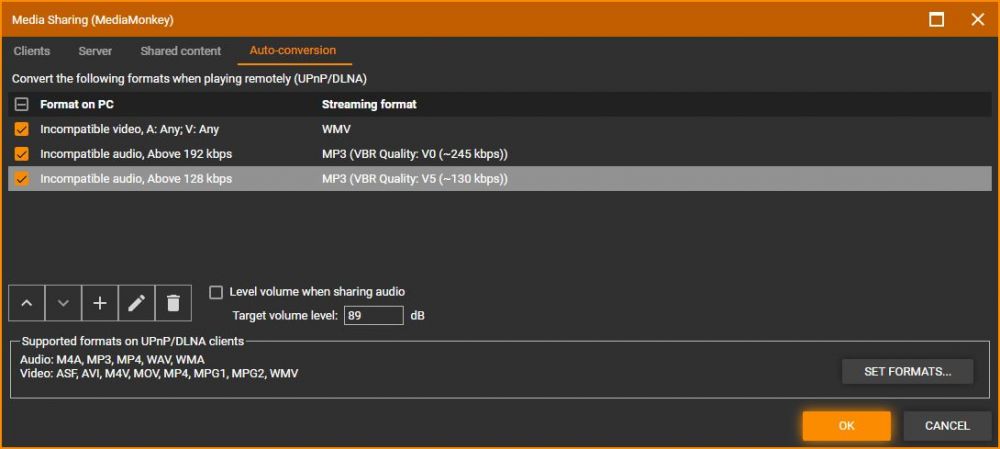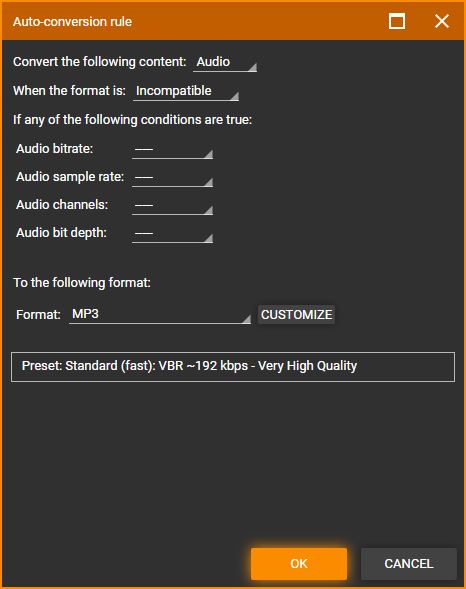WebHelp:Auto-Conversion Configuration/5.0: Difference between revisions
mNo edit summary |
mNo edit summary |
||
| Line 17: | Line 17: | ||
Whenever the device is [[{{WebHelp:Links|Exporting_Tracks}}|synced]] or [[{{WebHelp:Links|Setting_UPnP_DLNA_Media_Servers}}|streamed/cast]], any files that match a set of auto-conversion rules specified by the user are converted on-the-fly. | Whenever the device is [[{{WebHelp:Links|Exporting_Tracks}}|synced]] or [[{{WebHelp:Links|Setting_UPnP_DLNA_Media_Servers}}|streamed/cast]], any files that match a set of auto-conversion rules specified by the user are converted on-the-fly. | ||
* For [[{{WebHelp:Links|Setting_UPnP_DLNA_Media_Servers}}|stream/cast]] the Auto-Conversion settings are under '''Tools > Options > Media Sharing''' and then on the ''Auto-Conversion'' tab when you configure a Media Server. | * For [[{{WebHelp:Links|Setting_UPnP_DLNA_Media_Servers}}|stream/cast]] the Auto-Conversion settings are under '''Tools > Options > Media Sharing''' and then on the ''Auto-Conversion'' tab when you configure a Media Server. | ||
* For [[{{WebHelp:Links|Exporting_Tracks}}|Sync]] the Auto-Conversion settings are in the Device Profile. You can access this from the [[{{WebHelp:Links|My Computer}}|Devices & Services]] node in the Media Tree on the ''Sync Profile'' tab under Auto-Conversion.[[File:Wiki-MM5 Media Sharing Auto-Conversion.jpg|1000px|center|MediaMonkey Media Sharing Auto-Conversion Tab Options]] | * For [[{{WebHelp:Links|Exporting_Tracks}}|Sync]] the Auto-Conversion settings are in the Device Profile. You can access this from the [[{{WebHelp:Links|My Computer}}|Devices & Services]] node in the Media Tree on the ''Sync Profile'' tab under Auto-Conversion.[[File:Wiki-MM5 Media Sharing Auto-Conversion.jpg|1000px|center|MediaMonkey Media Sharing Auto-Conversion Tab Options]]<br><br> | ||
* ''Conversion Rules'' are set in the upper part. Conversion Rules define what format should be converted to what format.[[File:Wiki-MM5 Auto-Conversion Rule.jpg|466px|center|MediaMonkey Auto-Conversion Rule Settings]]<br><br> | |||
* ''Conversion Rules'' are set in the upper part. Conversion Rules define what format should be converted to what format. | |||
[[File:Wiki-MM5 Auto-Conversion Rule.jpg|466px|center|MediaMonkey Auto-Conversion Rule Settings]]<br><br> | |||
** Use ''Convert the following content'' to define it the rule applies to Audio or Video Files. | ** Use ''Convert the following content'' to define it the rule applies to Audio or Video Files. | ||
** Use ''When the formats is'' to define whether to convert ''Any'', All ''Incompatible'' or a specific File Type should be converted. ''Incompatible is any files not matching the settings in Supported Formats. | ** Use ''When the formats is'' to define whether to convert ''Any'', All ''Incompatible'' or a specific File Type should be converted. ''Incompatible is any files not matching the settings in Supported Formats. | ||
Revision as of 03:27, 15 December 2020
Introduction
MediaMonkey offers Auto-Conversion when synchronizing and when streaming/casting to other devices. Auto-Conversion will not modify the original files in your MediaMonkey Library. This allows you to maintain a library of many file types on your PC while still being able to sync/stream/cast those files in formats the device is able to play.
Auto-Conversion Allows You to
- Sync and stream/cast any file in your MediaMonkey Library for any device by auto-converting it to a format supported by that device on-the-fly
- Convert files on-the-fly to lower bitrates to make more effective use of the limited storage capacity on a portable device when synchronizing or slower network connection when streaming/casting
- Level the volume of synced or streamed/cast files so that they play at a steady volume on any device (useful for devices that don't support Replay Gain).
Conversion Rules
Whenever the device is synced or streamed/cast, any files that match a set of auto-conversion rules specified by the user are converted on-the-fly.
- For stream/cast the Auto-Conversion settings are under Tools > Options > Media Sharing and then on the Auto-Conversion tab when you configure a Media Server.
- For Sync the Auto-Conversion settings are in the Device Profile. You can access this from the Devices & Services node in the Media Tree on the Sync Profile tab under Auto-Conversion.

MediaMonkey Media Sharing Auto-Conversion Tab Options - Conversion Rules are set in the upper part. Conversion Rules define what format should be converted to what format.

MediaMonkey Auto-Conversion Rule Settings
- Use Convert the following content to define it the rule applies to Audio or Video Files.
- Use When the formats is to define whether to convert Any, All Incompatible or a specific File Type should be converted. Incompatible is any files not matching the settings in Supported Formats.
- Use If any of the following conditions are true to limit the rule to a specific characteristic of the files. For example, this will allow you to Auto-Convert Any files over 192Kbps Bitrate.
- Use To the following format to set the settings of how MediaMonkey should Auto-Convert. Under Format you set the File Type and using Customize you can set the specific settings to be used. For example, you can set it to convert MP3 to Standard: VBR ~192kbps - Very High Quality+.
If volume leveling is enabled, then:
- All tracks that are converted are leveled during the conversion process
- MP3 tracks are leveled using MP3 Gain style leveling (i.e. no loss in audio fidelity)
- For other tracks that don't need to be converted because they are in a format supported by the device, they are transcoded and leveled as follows:
- WMA --> WMA 128 kbps CBR
- OGG --> OGG Q4
- Other formats are encoded to the encoder defaults for the given format
- For other tracks that are in a format that isn't supported by the device, they are transcoded and leveled to MP3 128 kbps CBR
Note that any of these defaults can be overridden simply by adding a new conversion rule.
Related Information
| English |
Additional Help: Knowledge Base | Forum | MediaMonkey Support | MediaMonkey for Android Help | MediaMonkey 5 Help | MediaMonkey 4 Help